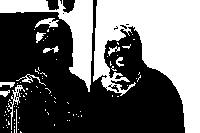
Mariama Sowe ’18, Hayat Fulli ’19 (both pictured here), and Irfan Alam ’18 helped organize last week’s events
The Muslim Student Association and the Office of Religious and Spiritual Life recently organized several events on campus to help broaden the community’s conceptions of Islam. These included a talk on Islam and politics, and a lecture that offered a counterpoint to mainstream media’s take on Islam and the Qur’an.
Islam and Politics, by Erica Hummel ’16
The Muslim Student Association invited Assistant Professor of Government Studies Barbara Elias to deliver a talk, “What You Don’t Know About Islam and Politics,” last Thursday evening. Elias specializes in international relations, Islam and politics, counterinsurgency warfare, national security and U.S. foreign policy. She received her Ph.D. from the University of Pennsylvania in political science and served as director of the Afghanistan/Pakistan/Taliban Documentation Project at The National Security Archive in Washington D.C.
Elias began her lecture by probing the crowd about what words they associated with Islam. Terms like “fundamentalism,” “terrorism,” and “foreign” echoed throughout the audience, highlighting the negative impressions Americans identify with the topic. However, as Elias illustrated, this negativity is misguided.
“The biggest victims of terrorisms are Muslims, by and large, far and away,” she began. “That’s something to keep in mind when we talk about fear of Islam, because Muslims are really paying the highest price” when it comes to violence worldwide.
Elias went on to debunk the theory that Islam is the same everywhere. “Islam is a plural concept,” she explained. As the second-largest faith in the world, with 1.6 billion adherents, Islam contains incredible heterogeneity. Headlines touting Islam’s connection with violence and extremism offer a narrow and distorted understanding of the religion throughout the world, where it is overwhelmingly a peaceful faith and a symbol of wholesomeness for many communities.
These same headlines present Islam as a simple explanation for geopolitical outcomes while underplaying many other important factors. “You hear ‘Islam’ as a shorthand way of explaining extremely complex political situations,” said Elias. “In reality the answer is a confluence of all sorts of variables: economy, oil production, dictatorship, U.S. or Soviet foreign policy, local politics…whether or not a country is [Islamic] tends to be overestimated.” However, Western media often fails to account for this complexity, preferring to opt for an easily digestible solution that further confirms Western biases about Islam’s incompatibility with peace and liberal democracy.
Elias also noted that the disconnect between Christian and Islamic political systems is partly due to differing perspectives on religion in the political sphere. “How we think about Islam can be just as much about ourselves as about Islam,” she noted. Western societies tend to think narrowly about nations that don’t secularize their politics, labeling them as “backward.” Thus, American discomfort with Islamic political systems illustrates a discomfort with religious political systems writ large rather than with Islam itself.
Elias’s talk comes at a critical time. In today’s American discourse, Islam is often associated with extremism, autocracy, and violence. With more appreciation of the facts surrounding Islam and politics, we can come to a more complete understanding of how to achieve healthy and peaceful political systems around the world, she said.
The Qur’an, by Katherine Churchill ’16
Students and community members gathered the next night in the Beam Classroom to view a screening of a lecture, “Cooperating in Matters of Goodness,” by Nouman Ali Khan at the University of Maine, Orono. Khan is the founder of Bayyinah, an institute devoted to promoting Arabic and Qur’anic studies.
Khan’s lecture focused on the Qur’an’s stance on cooperation between people of different faiths. He began by recounting an instance when one of his daughters did not do her homework. He was scolding her when his other daughter began to chastise her as well. Khan used this anecdote as a metaphor for why followers of the Qur’an should not judge the actions of others and people of other faiths. According to Khan, condemning other people for their failure to follow the Qur’an or Islamic teachings is overstepping one’s authority; only God, he said, has the right to judge. Khan discussed the passages in the Qur’an that display this message, reading and interpreting from Arabic for the audience. As he talked about sections of the Qur’an, Khan stressed the importance of reading the Qur’an in context, stating that to view quotes in isolation typically results in misinterpretation.
Khan further discussed how the Qur’an actually explicitly encourages interfaith communication and exchange. He talked about how the Qur’an allows Muslims to eat with their Jewish and Christian neighbors, and so encourages Muslims “not just to tolerate each other,” but also to befriend people of other faiths. Khan suggested that the Arabic word for nation also means “a crack in the wall,” implying that nations aren’t complete without cultural exchange.
Following the lecture screening, one of the student organizers, Mariama Sowe ’18, asked the audience for questions, and played the corresponding sections of Khan’s question-and-answer section at Orono. One audience member asked about the Qur’anic roots of the ISIS insurgency, to which Khan replied, “They’re crazy.” He then went on to state that ISIS’s actions are utterly against the teachings of the Qur’an.
Bob Ives, Bowdoin’s director of Religious and Spiritual Life, said events such as these shed light on the true nature of Islam. “Most Christians would be horrified if they were judged by the actions of the KKK and most Muslims are equally horrified by being compared to ISIS,” he noted.


